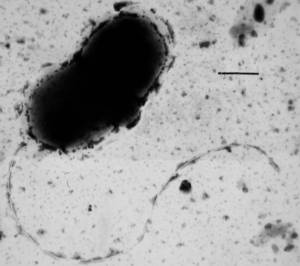The time when the Earth's atmosphere turned oxygen-rich is a key milestone in our understanding of the evolution of life on the planet. It marks the point when the environment became capable of supporting much more complex life including, ultimately, us. Previous scientific evidence had pointed to this "great oxidation" event taking place about 800 million years ago. But now analysis of ancient rocks called the Stoer Group in the far north of Scotland has provided strong evidence for an even earlier rise in oxygen levels, 1.2 billion years ago or 400 million years earlier than first thought.
The discovery, published in the journal Nature, was made by University of Aberdeen geologist Professor John Parnell and his colleagues using what they dub "chemical fossils". The team extracted samples of sulphur from iron sulphide (iron pyrites, fools gold) in the rocks and compared the levels of sulphur isotopes.
Sulphur is normally found in two forms, a lighter 32S form and a heavier 34S form.  Early microbial communities, operating in the absence of oxygen, evolved to reduce sulphates (SO4) to sulphides (S), preferring the lighter 32S form when they did so.
Early microbial communities, operating in the absence of oxygen, evolved to reduce sulphates (SO4) to sulphides (S), preferring the lighter 32S form when they did so.
This means that rocks containing samples from these early bacterial inhabitants tend to have a relative excess of 32S (>75%) compared with 34S (<25%), which then switches around (with 34S comprising over 50%) once new oxygen-utilising microbes evolve that convert sulphides back into sulphates.
What the 1.2 billion year old Scottish rocks revealed, however, was precisely this latter result - high levels of the heavier sulphur isotope - indicating that even at this ancient age, oxygen-using bugs had already evolved. And because the rocks were part of what would have been a lake system and hence exposed to the atmosphere, the rock record the scientists have uncovered is a reliable proxy for what must have been happening worldwide.
Commenting on the implications of the discovery, John Parnell says "we are pushing back the time when there was enough oxygen in the atmosphere to support the evolution of complex life. What we've shown is that there was enough oxygen around that the atmosphere was not a barrier to that evolution."









Comments
Add a comment